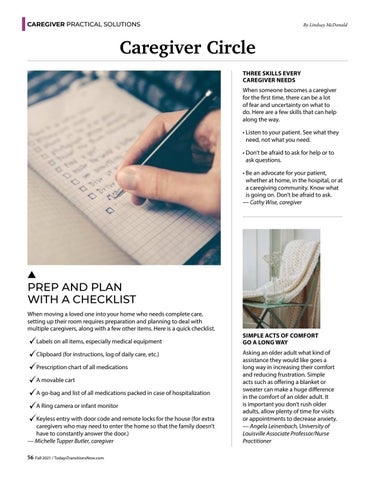CAREGIVER PRACTICAL SOLUTIONS
By Lindsay McDonald
Caregiver Circle THREE SKILLS EVERY CAREGIVER NEEDS When someone becomes a caregiver for the first time, there can be a lot of fear and uncertainty on what to do. Here are a few skills that can help along the way. • Listen to your patient. See what they need, not what you need. • Don’t be afraid to ask for help or to ask questions. • Be an advocate for your patient, whether at home, in the hospital, or at a caregiving community. Know what is going on. Don’t be afraid to ask. — Cathy Wise, caregiver
PREP AND PLAN WITH A CHECKLIST When moving a loved one into your home who needs complete care, setting up their room requires preparation and planning to deal with multiple caregivers, along with a few other items. Here is a quick checklist. Labels on all items, especially medical equipment Clipboard (for instructions, log of daily care, etc.) Prescription chart of all medications A movable cart A go-bag and list of all medications packed in case of hospitalization A Ring camera or infant monitor eyless entry with door code and remote locks for the house (for extra K caregivers who may need to enter the home so that the family doesn’t have to constantly answer the door.) — Michelle Tupper Butler, caregiver 56 Fall 2021 / TodaysTransitionsNow.com
SIMPLE ACTS OF COMFORT GO A LONG WAY Asking an older adult what kind of assistance they would like goes a long way in increasing their comfort and reducing frustration. Simple acts such as offering a blanket or sweater can make a huge difference in the comfort of an older adult. It is important you don’t rush older adults, allow plenty of time for visits or appointments to decrease anxiety. — Angela Leinenbach, University of Louisville Associate Professor/Nurse Practitioner
